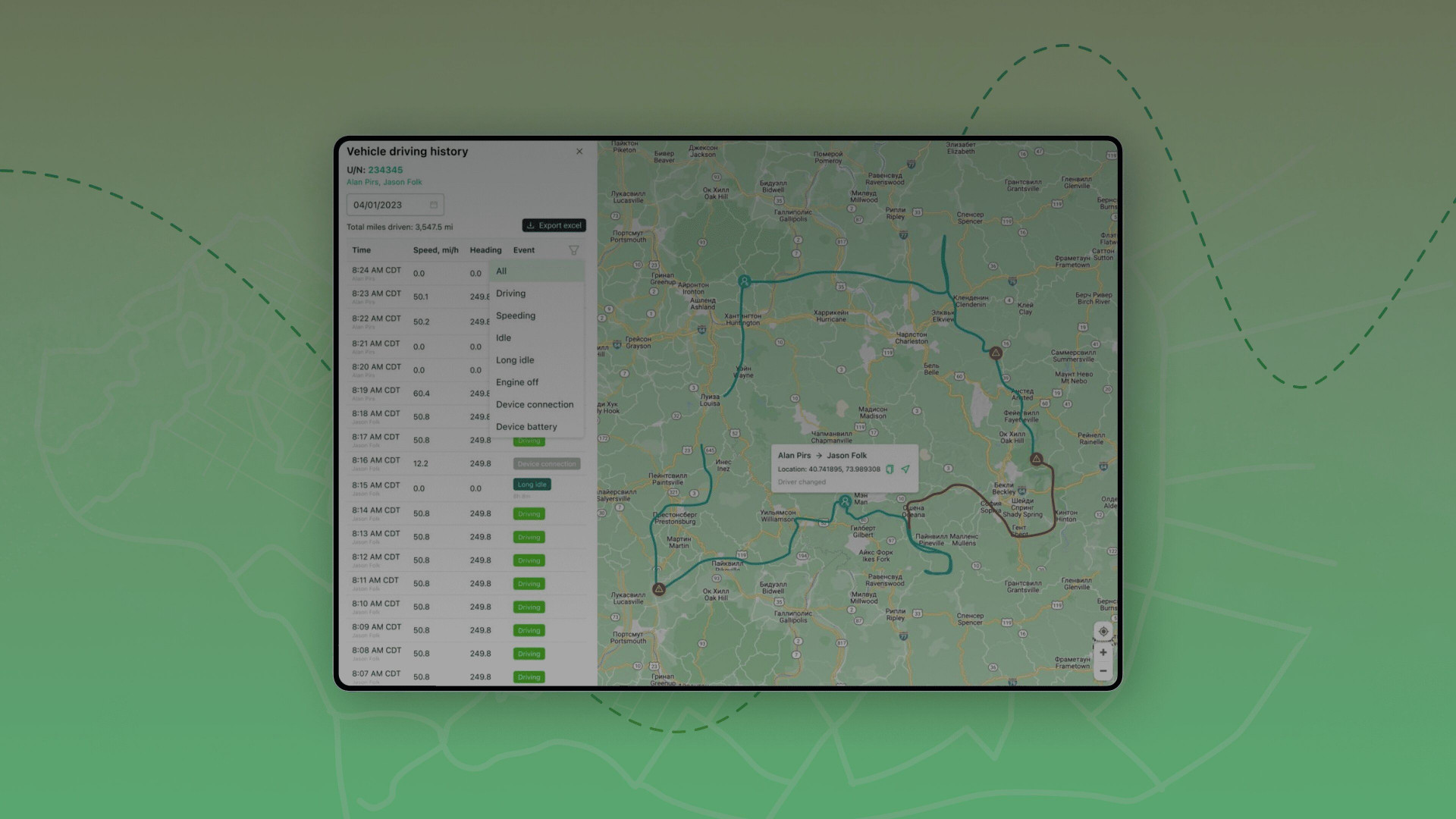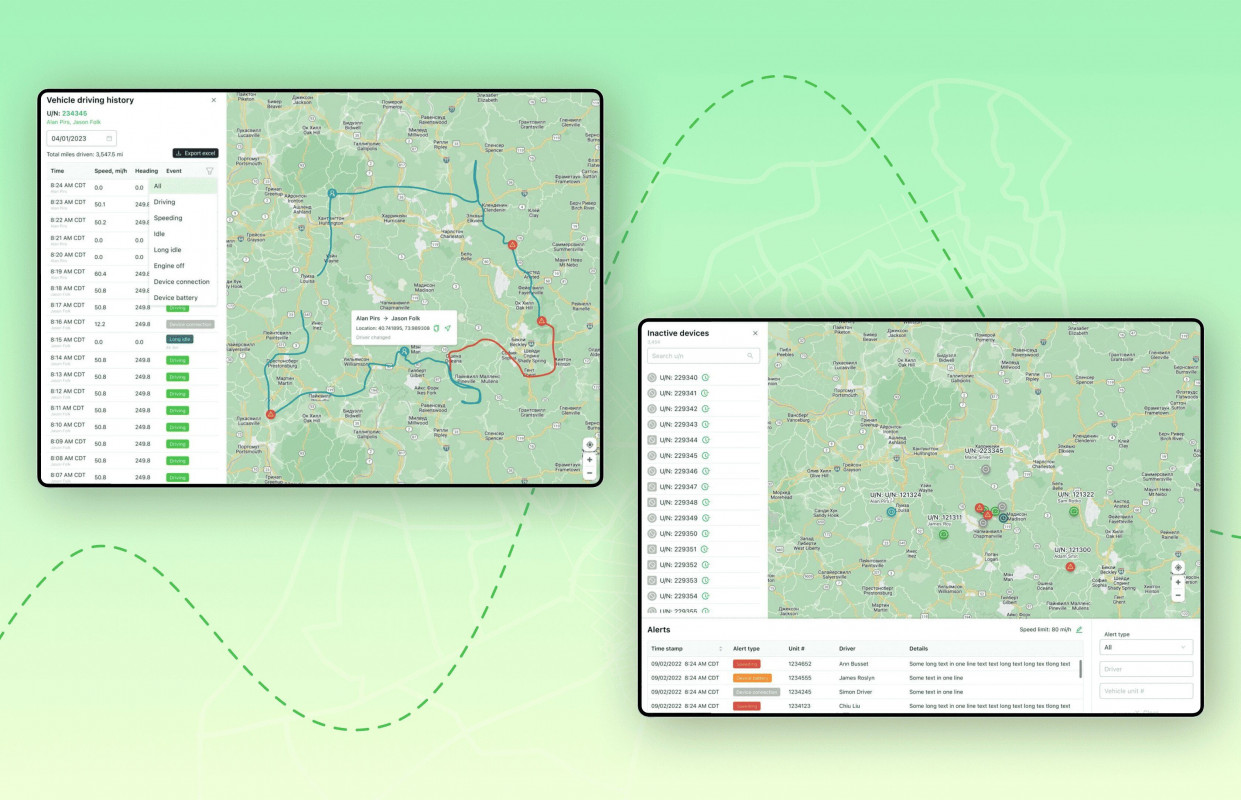

Data collection and standardization
This vehicle sensor data visualization and reporting tool is based on Teltonika FMB920 telematics devices installed on all customer trucks. They transmit data via GPS, accelerometer, and CAN bus, and their update frequency reaches 10 Hz. All messages in this CAN bus data analysis software for trucks are transmitted via Teltonika's proprietary protocol over TCP/UDP and are converted to a unified JSON format on the client side.
Route event modeling
The algorithms record vehicle behavior based on current coordinates, speed, and accelerometer data. They determine the route deviation (if it diverges from the GPX trajectory), idle time (if speed = 0 during a specified interval), speeding (either by CAN parameters or by calculating coordinates/time), and aggressive driving (with sharp acceleration/braking calculated using the accelerometer). The fleet data analysis system also required ADAS scenarios based on processing events such as collision.warning, lane.departure, and distance.event, algorithms aimed at generating reports, and a number of integrations.

Data processing and flows
Data processing in this route deviation and geofence alert system occurs in batch mode: JSON files are exported to Excel tables without using a DBMS. This enables flexible analysis even in limited computing environments. Additionally, we implemented integrations with the client's corporate systems via REST API and an MQTT broker, which allowed us to synchronize this custom truck fleet sensor data analytics system with external TMS/ERP systems, logistics exchanges, and client portals.
Teltonika FMB920
Teltonika FMB920 – universal tools for real-time GPS tracking for trucks with a CAN interface and accelerometer, which enable receiving extended telematics data (speed, acceleration, fuel consumption, engine status, etc.) with a high frequency of up to 10 Hz. The client chose them for their reliability, compact form factor, and compatibility with international FMS standards.
Teltonika proprietary protocol (TCP/UDP
Teltonika proprietary protocol (TCP/UDP) – this secure truck data transmission protocol provides reliable transmission of large amounts of data with minimal delays; its advantage is the ability to be used to deliver messages from the tracker to the central system without intermediate gateways.
JSON
JSON – a unified message format, which was chosen as a data exchange standard, providing structure, readability, and compatibility with various analysis and integration tools; in this fuel consumption analysis tool for logistics, it ensures processing telematics regardless of the device model.
Excel (flat files)
Excel (flat files) – are used in this route deviation detection tool as the main solution for storing and analyzing data, as they do not require installation and maintenance of a DBMS. This tech stack component also ensures that analytics is accessible even to users without a technical background.
Python processing (batch mode)
Python processing (batch mode) – was used in this driver behavior analytics solution for batch processing of JSON messages and converting them to Excel; we chose it for its wide ecosystem for data processing and flexibility in setting up pipelines.
REST API
REST API – provides fleet telematics integration with ERP, TMS, and a number of client platforms, with access to route events, statuses, and reports. It also provides easy integration via standard HTTP requests.
MQTT broker
MQTT broker – implements a subscription to events in real time (e.g., route deviation, speeding, etc.). Our team chose it for GPS and accelerometer data analysis in transportation for its extensive scalability, compatibility with IoT devices, and low network load.
Centralized data analysis
We were able to effectively combine data from hundreds of trackers in a single JSON format in this vehicle telematics analytics solution, thereby eliminating the data chaos associated with differences between devices. Thanks to the flat file format, analytics in this fuel efficiency monitoring software can be performed in Excel, which, in turn, reduces server costs and simplifies data access for managers.
Route control and behavioral analysis
The truck sensor data platform automatically detects deviations from the route, as well as records downtime, speeding violations, and aggressive driving. All events can be viewed both in reports and via API. Support for ADAS scenarios strengthened control over traffic safety and gave the client an effective telematics data visualization tool for preventing potential emergency situations.
Integrations for full synchronization of data streams
We provided a full-fledged REST API and MQTT broker in this CAN bus vehicle diagnostics solution, allowing the client to connect TMSes, WMSes, or ERPs via webhook or broker connectors. Our team has also made it possible to connect this harsh driving detection system to third-party logistics platforms or client portals – this is done through the same REST/MQTT API and configured intermediate connectors.

